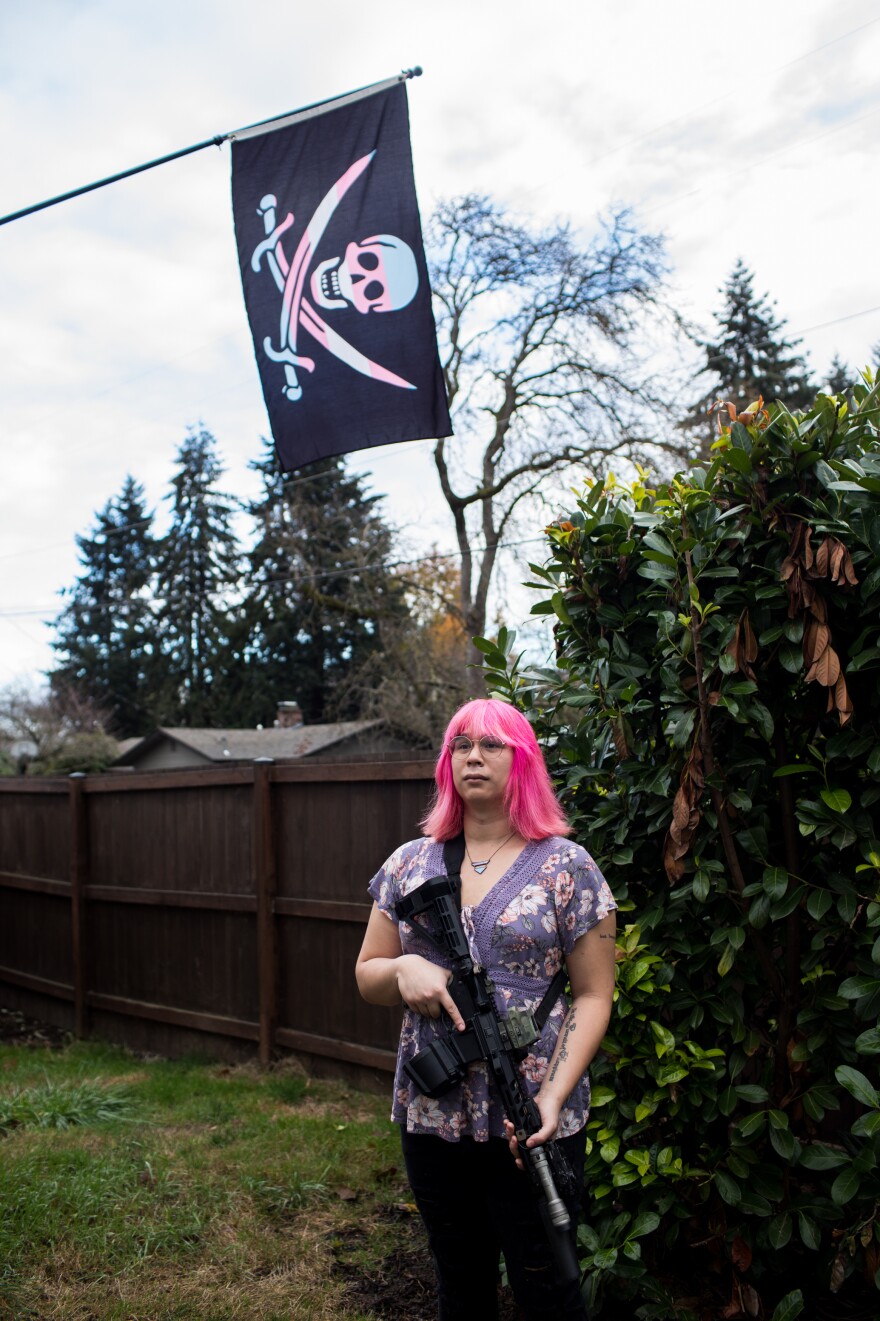Updated December 16, 2022 at 4:58 PM ET
Some of Oregon's trans and queer gun supporters are worried that a new state law will prevent them from buying firearms.
The law, Measure 114, grants county sheriffs and police chiefs discretion to determine who qualifies to purchase a firearm under a new permit-to-purchase program.
But Measure 114 lacks criteria clearly defining what disqualifies applicants, details on what makes someone a threat and what data can be used by law enforcement in making that decision. That's a problem for activists who have critiqued law enforcement, particularly in the racial justice protests that took place over the past two years.
"I just feel like if I was to go online and say like the police are terrorists or something ... [the police] would be like, 'Well, you seem like you might not be fit for this community to be armed,' " says Mia Rose, a trans person of color and former licensed firearms dealer. "If they were to get that information that you got snatched up off the street [arrested during the Portland protests prompted by the killing of George Floyd in 2020], I would assume that the law would say they could deny your purchase, or deny your right to have a permit."

Rose focuses her efforts on sales and training for LGBTQ+ and black, Indigenous and people of color (BIPOC). She said she and her friends were initially drawn to guns out of fears that grew during the Trump presidency. Recent shootings like those in the LGBTQ Club Q last month in Colorado Springs, Colo., that left 5 dead or at a school in Uvalde, Texas, in May that killed 19 students and 2 teachers have solidified their desire for armed community defense – they feel police are not there to protect them, or even willing to protect them.
"Around 2016 ... there was an increase in white supremacist violence on places of worship, like mosques or like gay bars," says Rose. "And then every time there's a shooting, more and more people, especially in the queer and trans community, they see this and it's like, OK, let's start to do things."
Activist Ross Eliot shares the desire for community defense and opposition to Measure 114. Rose and Eliot worry the law will disproportionately inhibit outspoken marginalized groups from purchasing guns, while doing little to prevent domestic terrorism. This is due to a confluence of factors, from the rise of 3D printed 'ghost-guns' to reports of ties by some Oregon law enforcement officials to right-wing groups like Patriot Prayer and the Oath Keepers.

"Given abuses widely documented among law enforcement, [Measure 114] would create an environment ripe for further corruption," Eliot says. "Police could easily restrict permits to preferred individuals and deny others without oversight to determine if people from particular racial or ethnic groups, religious backgrounds, LGBTQ status or political affiliations were being screened out."
Proponents of the law say it came as a response to mass shootings and hate crimes. Liz McKanna, chairwoman of Lift Every Voice Oregon, the group that wrote Measure 114, highlights that states that have passed similar laws have statistically shown decreases in gun deaths and injuries.
McKanna discounted the concerns about police bias.
"The state police, I believe, will be drafting regulations that might clarify that law," she said. "But they're intended to be objective, and not something that's left to the whim of law enforcement. You also ask why did we leave it to law enforcement? The statute says that it can be, you know, the sheriff or police or their designee. And it's still possible that the legislature would choose another agency to actually be the permit agent."
McKanna points toward the requirement outlined by the new state law that there is to be an annual publication by police of the number of permit applications made, approved, and denied, as well as the reason for denial. She says the aim of the publication is to function as a mechanism to root out bias.

However, any data published beyond the metrics above, including factors such as race, gender, or sexuality, will be decided by state police.
"We're leaving that up to them," she said. "It may be important for ensuring that there's not a disparate impact. And so that's one of the issues that's being discussed. ... I can't answer how it's going to be resolved, but we are confident that it will be resolved."
When asked what criteria would be used to deny applicants under the new law, and if social media, political views, or condemnation of law enforcement could be used in making the determination, Oregon State Police replied with a link to the Firearms Instant Check System — procedures the agency says have been in place since 1996.
For now, the measure's opponents have won a partial victory.
Last week a state judge blocked Measure 114 from taking effect only hours after a federal judge gave it the go-ahead, albeit with a delay in its original Dec. 8 implementation. The state judge upheld his temporary restraining order at a hearing earlier this week.
Attorneys for the state requested a hearing for Dec. 23.
Copyright 2023 NPR. To see more, visit https://www.npr.org.


